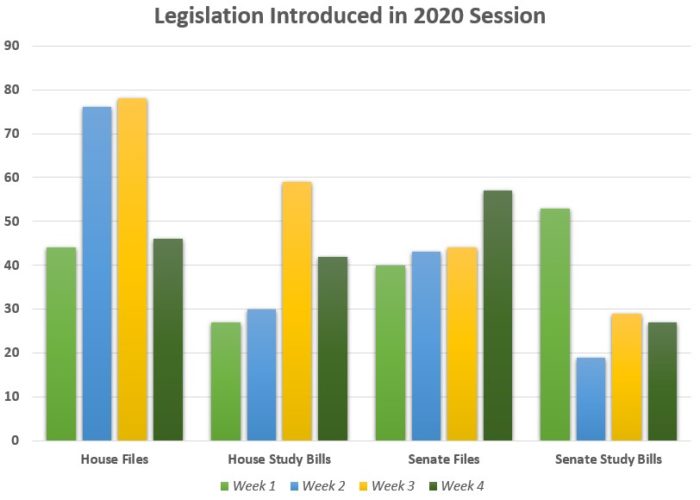This content was published prior to the combination of Dentons Davis Brown. Learn more about Dentons Davis Brown.
While week four of the Iowa General Assembly was extremely active with legislation being both introduced and acted upon, it will most likely not be remembered for that. Rather, it will be remembered as the week of the 2020 Iowa Caucuses.
The Iowa General Assembly, as is customary during a caucus year, was not in session on Monday, February 3, to allow legislators to participate in their respective caucuses. What was not customary was how the Iowa Caucuses unfolded. Needless to say, on the Democratic side, validating and reporting caucus results did not go as planned. Below are the results as of Friday, February 7:
Republican Caucus
- President Donald Trump – 31,186 delegates (97.2%)
- Former Governor William Weld – 422 delegates (1.3%)
- Former Congressman Joe Walsh – 348 delegates (1.1%)
Democratic Caucus (top 4)
- Mayor Pete Buttigieg – 564.012 delegates
- Senator Bernie Sanders – 562.497 delegates
- Senator Elizabeth Warren – 387.069 delegates
- Former Vice-President Joe Biden – 341.172 delegates
Quick Movement in the Iowa Legislature
Both chambers moved nearly 130 bills through the legislative process in this shortened week. It is clear that committee chairs have instructed their members to continue moving bills through the subcommittee process so that committees can take action on priority legislation. With only two weeks left until the first funnel week (week six, February 17-21), the urgency to get bills through at least one committee continues to build. Bills that do not advance through one committee by the end of week six are deemed “dead” and legislative action on those bills will cease for the remainder of the legislative session.

Exceptions to the Funnel
Appropriations or Ways and Means bills are not subject to the funnel; bills are technically “alive” until the General Assembly has gaveled out for the year. Also note, there are opportunities for bills that are deemed “dead” to return as leadership bills or within policy language of an appropriations bill–nothing is final until sine die, the final drop of the gavel for the 2020 session.
Floor Work
Typically, this time of year is reserved for subcommittee and committee work and the floor work begins after the first funnel. On Thursday, the Senate bucked that trend–the week ended with the first floor work of the session, the Senate approved four bills on the floor. Most notably, the Senate unanimously passed the Supplemental Appropriations bill (SF 2144) largely designed to allocate additional flood recovery money for cleanup and mitigation along the Missouri River ($20 million to Homeland Security and Emergency Management) as well as a $333,000 appropriation to the Department of Human Services for Glenwood Resource Center, a residential facility for those with intellectual disabilities which has been under significant scrutiny in the past year.
Appropriations
As we noted in week three, the chambers continued work on their education funding plans (School State Aid “SSA”).
- House SSA (HF2243 formerly HSB587) which increases state education spending by 2.5% ($100 million), was approved by the House Education Committee on Tuesday and placed on the House Debate calendar.
- Senate SSA (SF2142 formerly SSB3096) which increases state education spending by 2.1% ($90 million), was approved by the Senate Education Committee on Tuesday and placed on the Senate Debate calendar.
It is expected both of these bills will be debated early next week. Advancement of these bills in week four is also a good indication of the pace and productivity of this legislative session. If the chambers come to a quick agreement on their budgeted differences in their respective SSA bills ($10 million-dollar difference) we may see our first appropriation bill advancing to the Governor around the first funnel week.
Governor’s Priorities
There was significant action on two of the Governor’s major priority bills this week. The Invest in Iowa Act (SSB 3116/HSB 657) was introduced in both the House and the Senate and the Future Ready Iowa bills (SSB3077/HSB607) were heard in subcommittee in both chambers.
The Invest in Iowa Act was one of the initiatives Governor Reynolds touted in her Condition of the State Address and is designed both as tax reform and water quality funding.
In order to raise the sales tax by a penny, as was the intent of the Constitutional Amendment passed 10 years ago, Governor Reynolds pledged to reduce the overall tax burden of Iowans. Here are the details of the Invest in Iowa Act (SSB 3116/HSB 657) as introduced:
- Increase the sales tax a full penny to fund water quality initiatives.
- Reduce individual income taxes: implementing a top rate of 7.48% in 2021 and then lowering that top rate to 5.5% in 2023 if the revenue targets are met.
- Eliminate the 4% growth trigger currently in law to allow tax cuts to occur without hitting the growth threshold.
- Remove the County Mental Health levy and shift the bulk of the mental health cost to the state General Fund to cover the majority of cost that currently rests at the county level. This is designed to reduce property taxes for businesses and individuals.
- Fund the Outdoor Recreation Trust Fund, with a change in the percentage of monies going into the existing formula and strengthen language around the use of the dollars.
- Allow families with an income up to $90,000 to take the child care tax credit, currently limited to families with income of up to $45,000.
- Eliminate the excise tax on water.
The Future Ready Iowa Act is Governor Reynolds’ plan to address the workforce shortages Iowa is currently experiencing. The comprehensive workforce bills (SSB3077/HSB607) include:
- Child-care program for working Iowans
- Workforce diploma pilot program
- Computer science instruction
- Work-based learning coordinators
- Senior year plus program
The Future Ready Iowa proposals advanced through subcommittees in both chambers with the recommendation for the Commerce committees to pass the legislation.
We can expect both of the Governor’s priorities to receive significant attention this legislative session.


